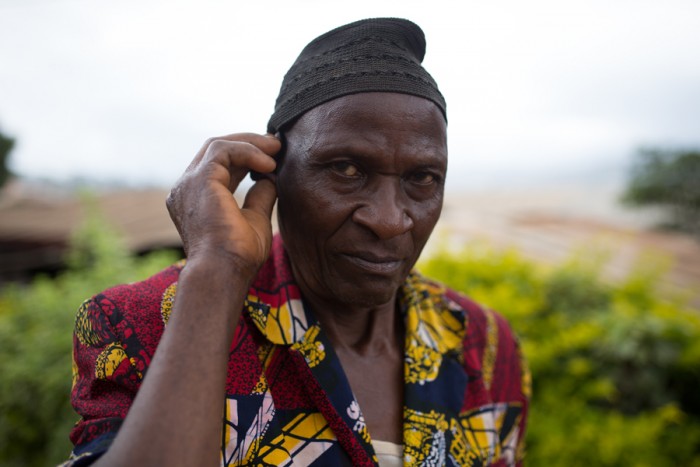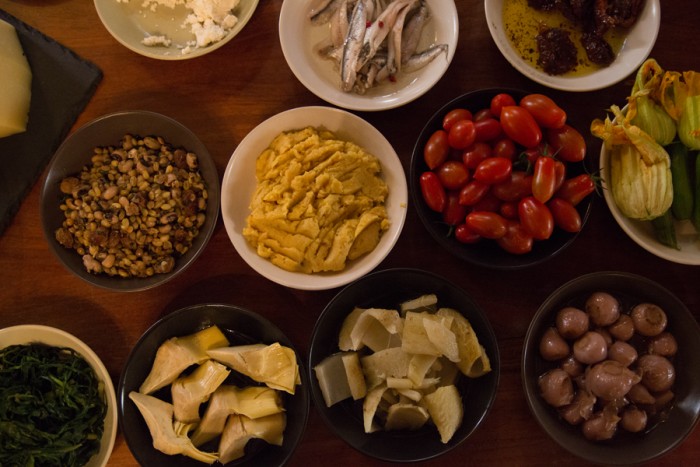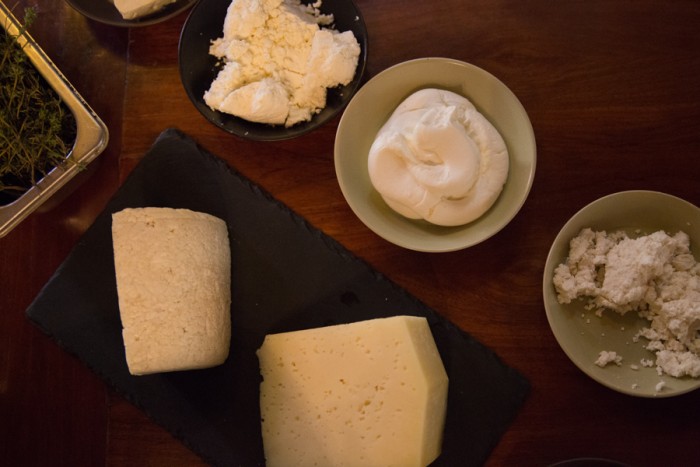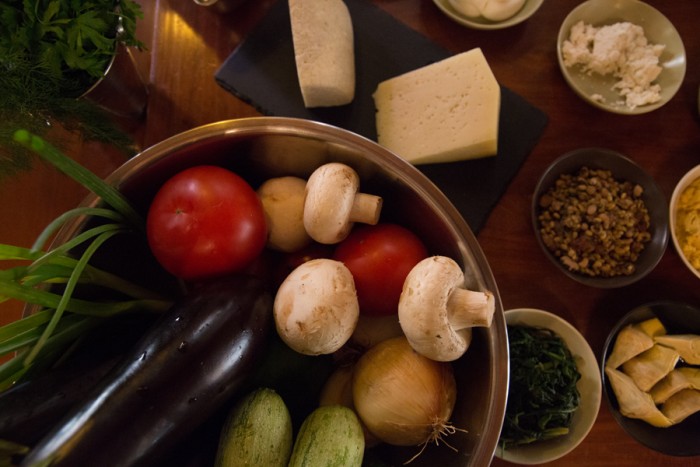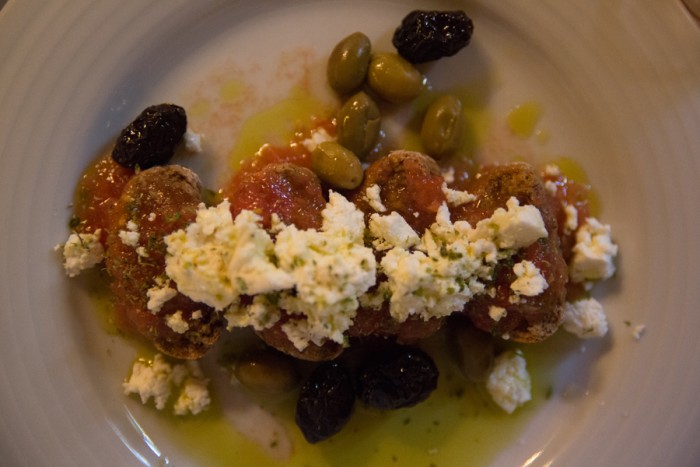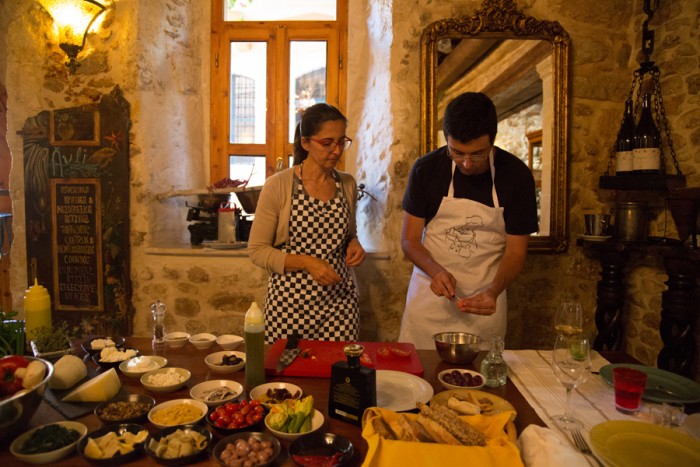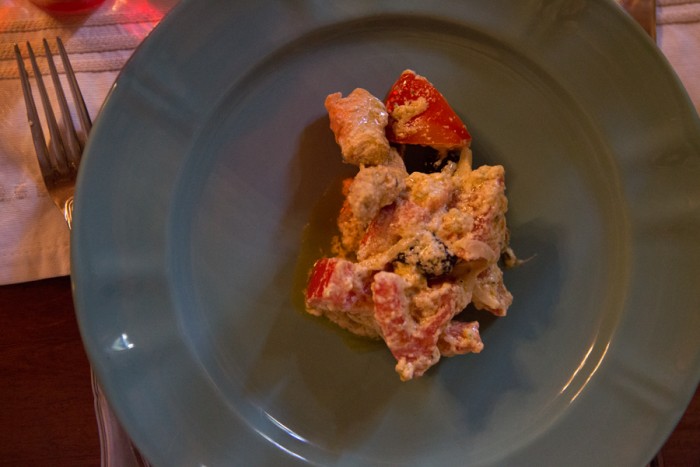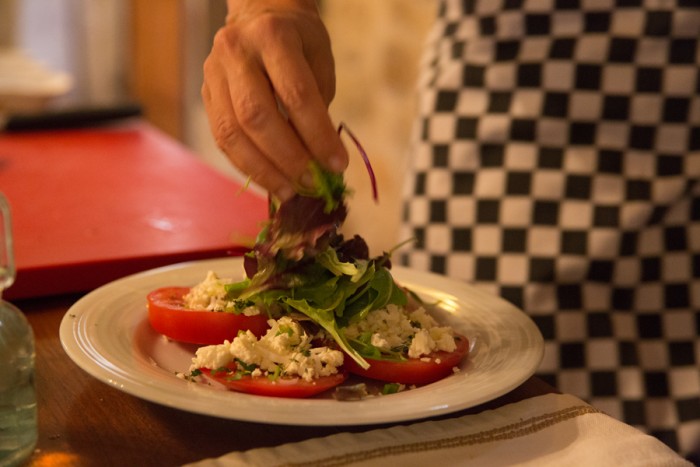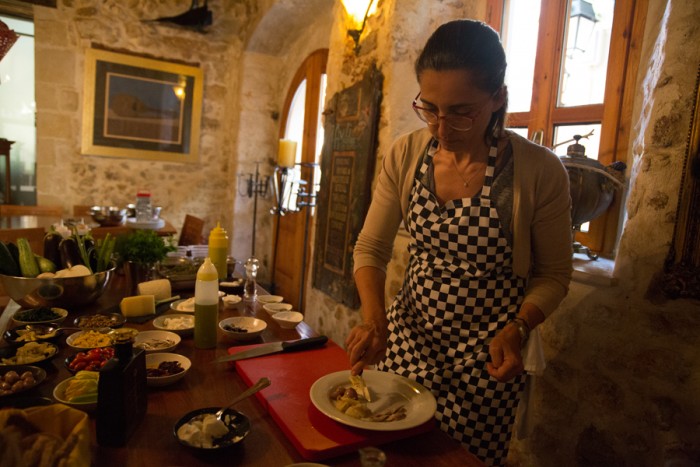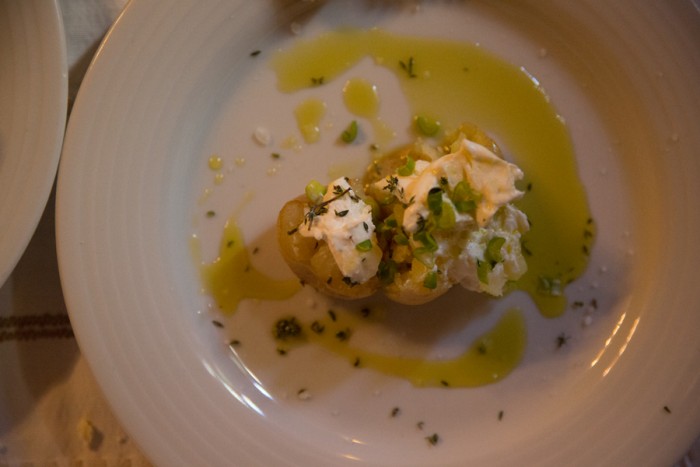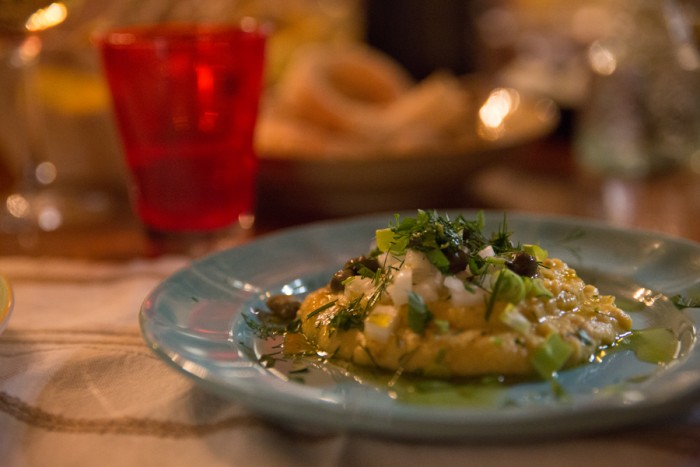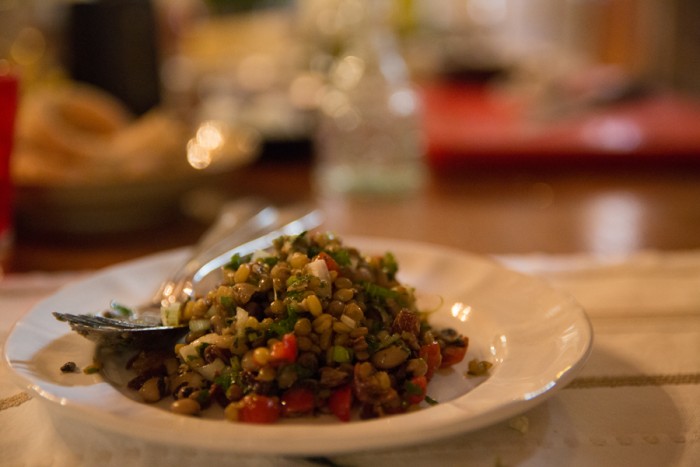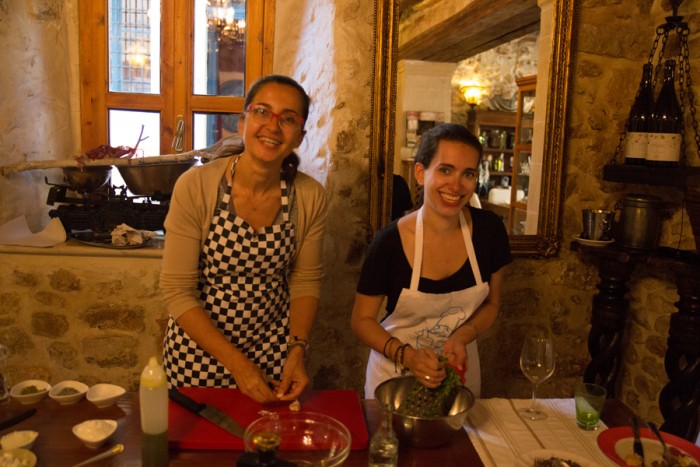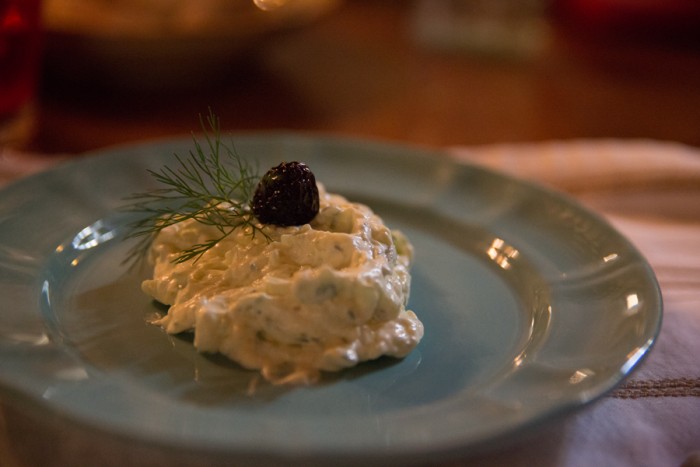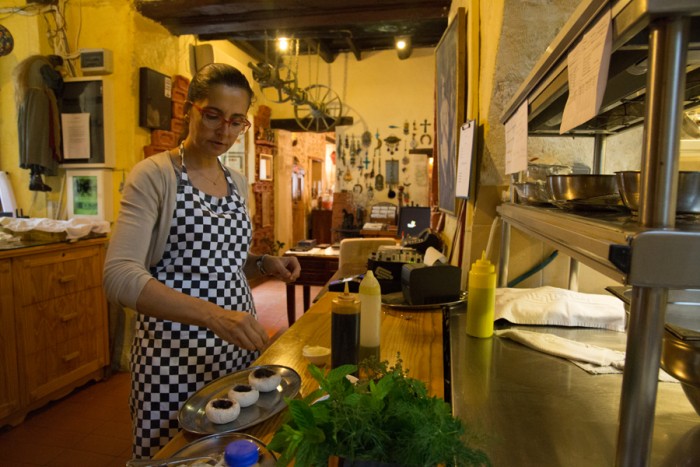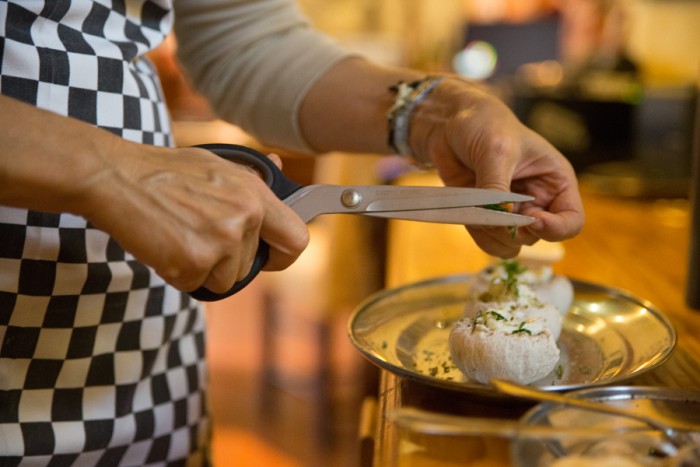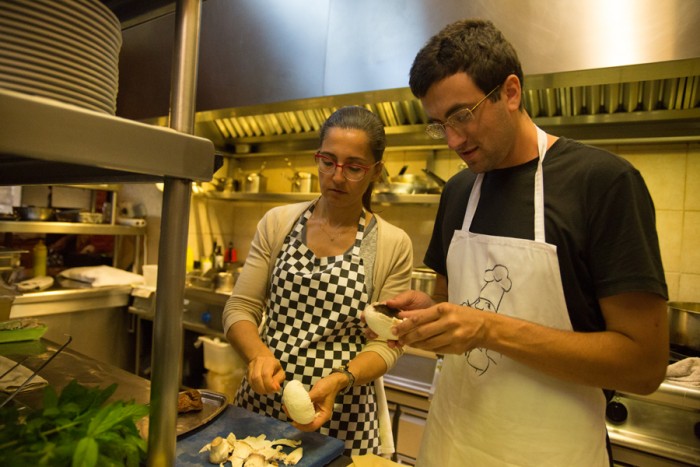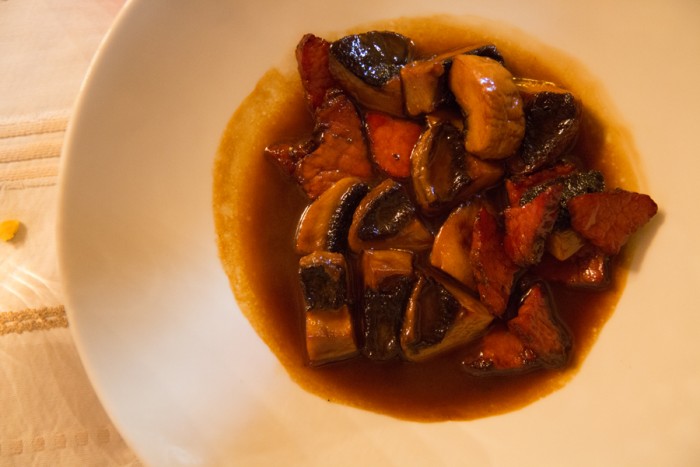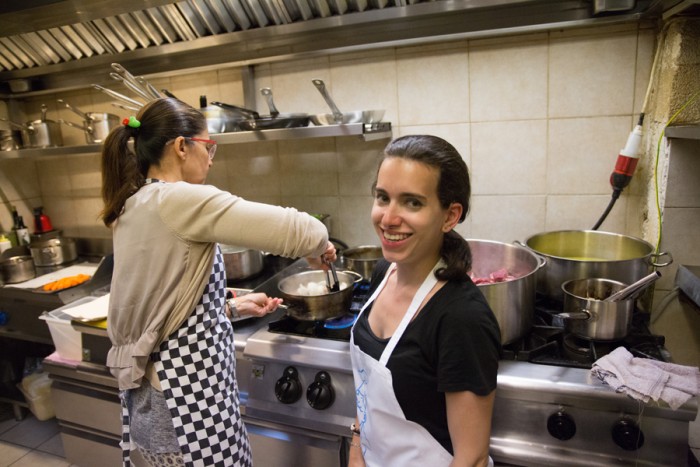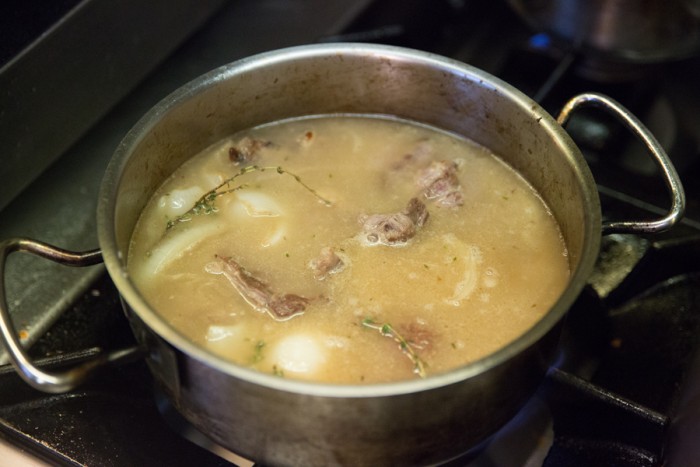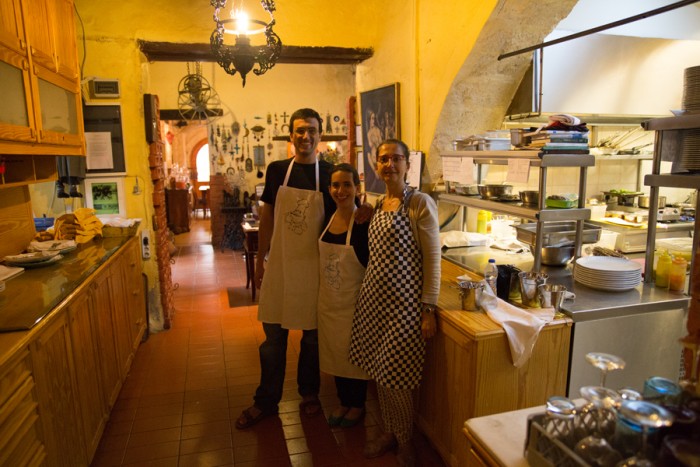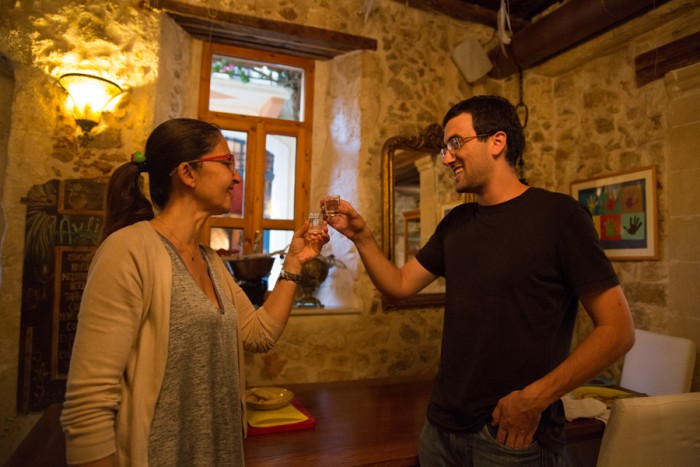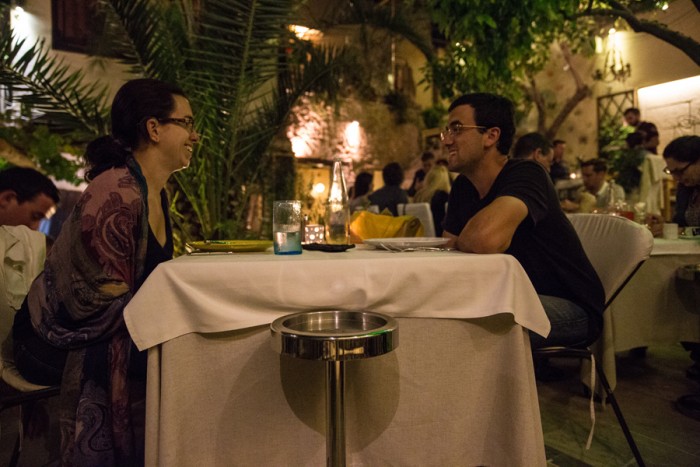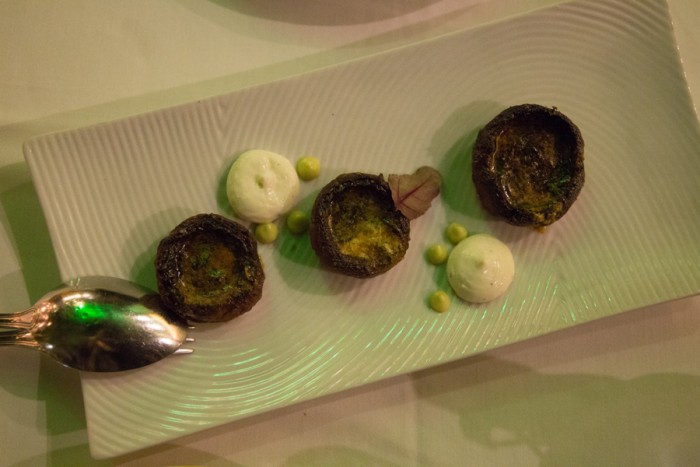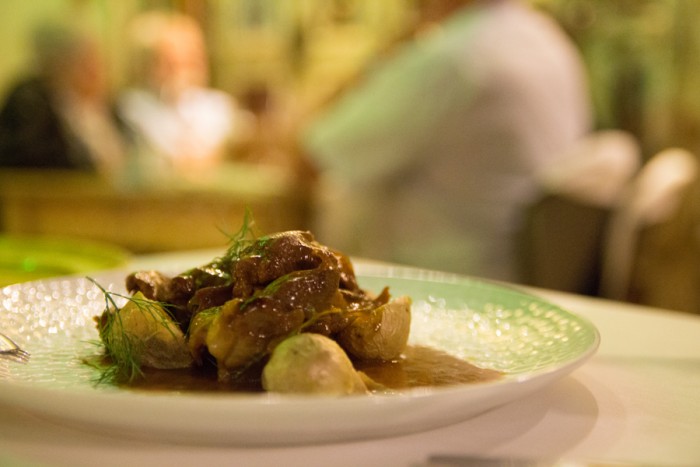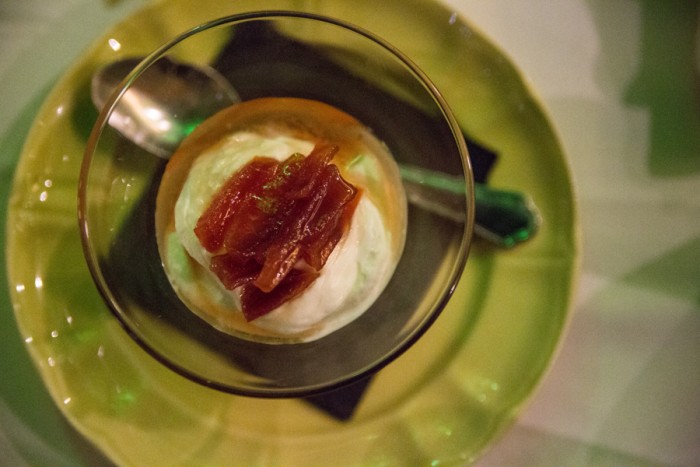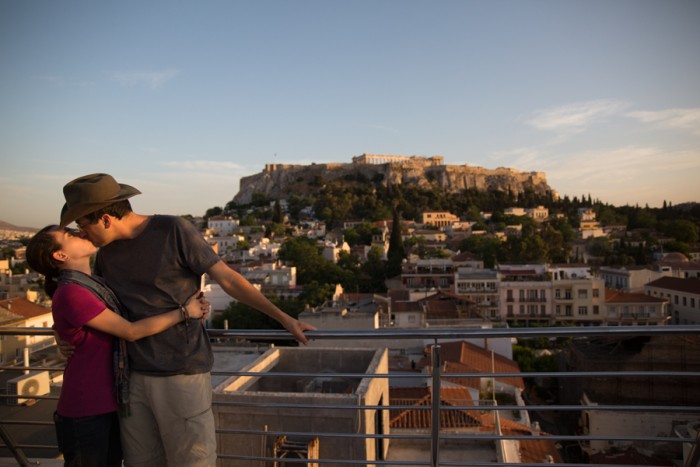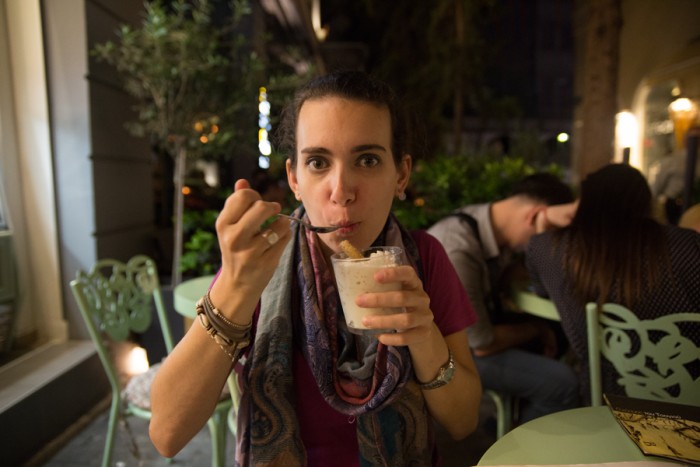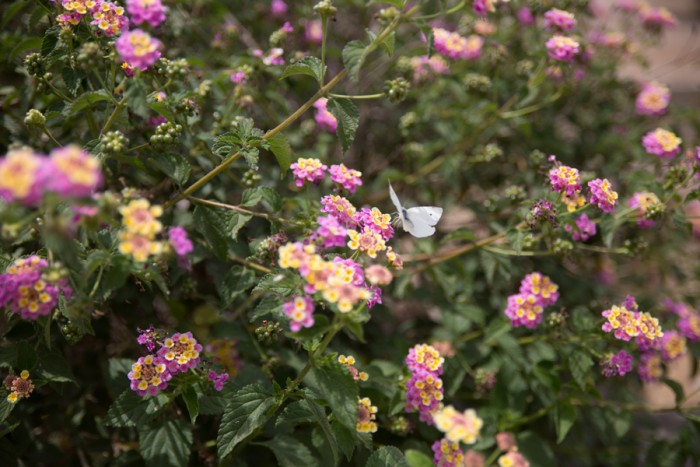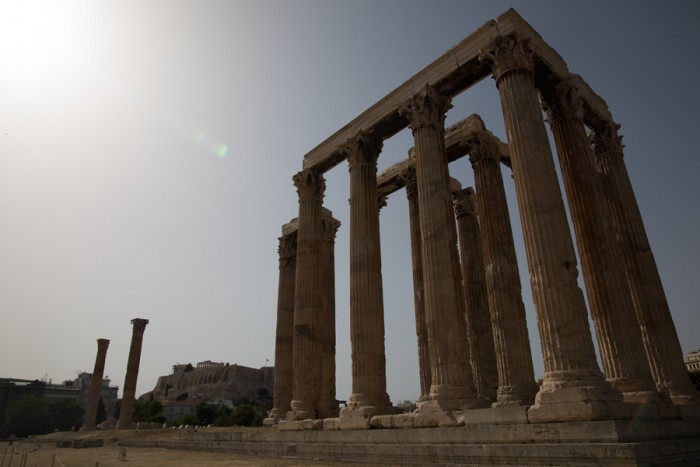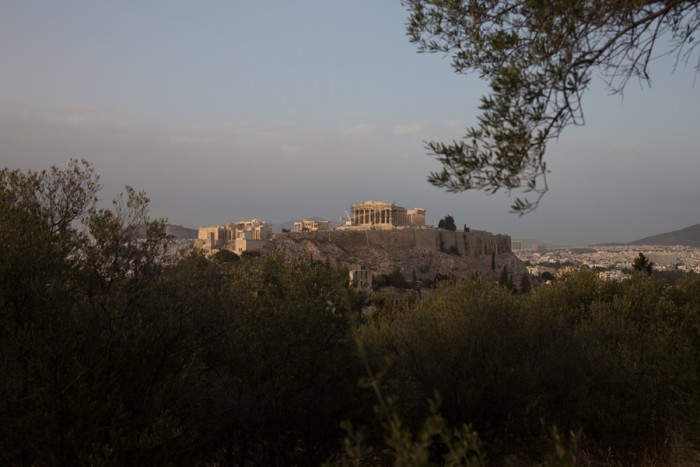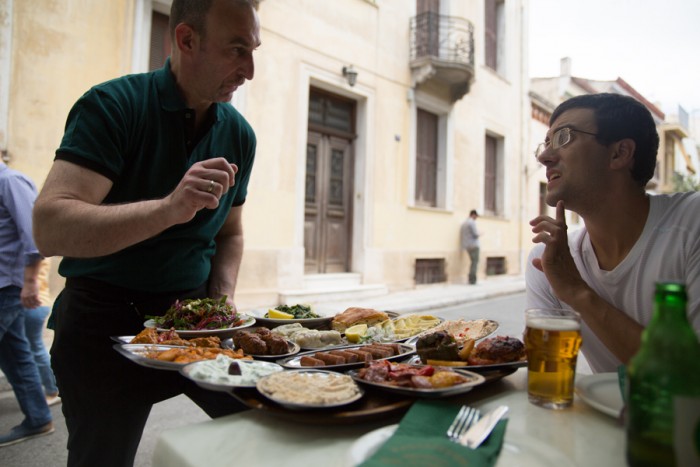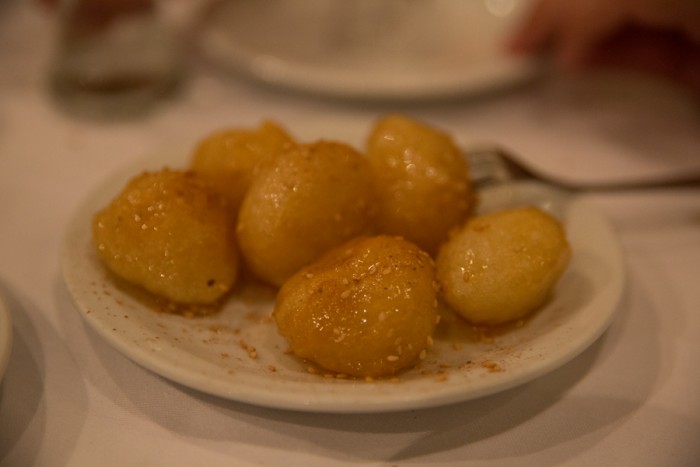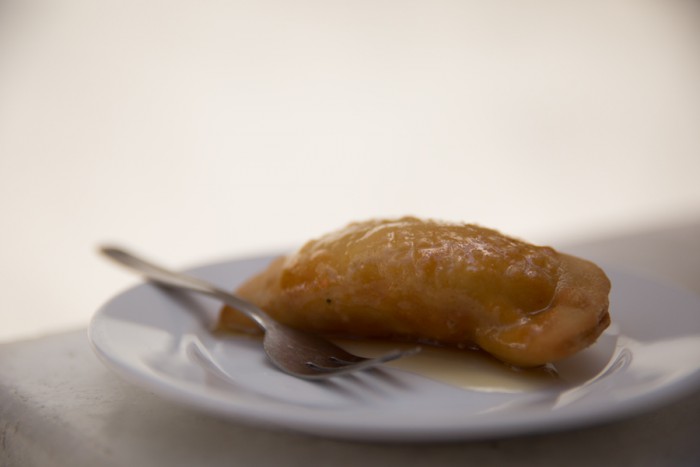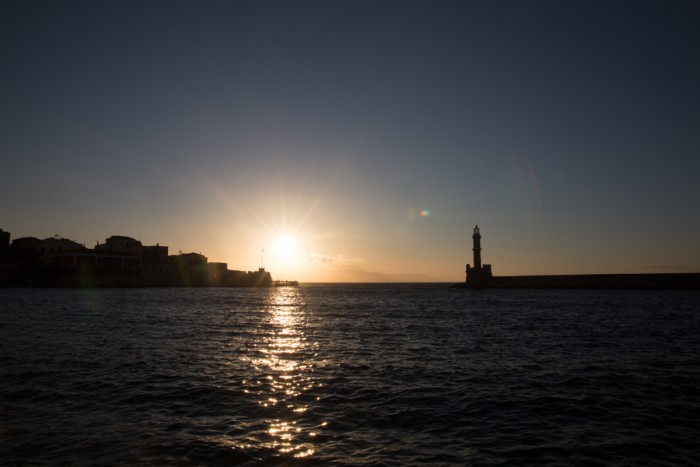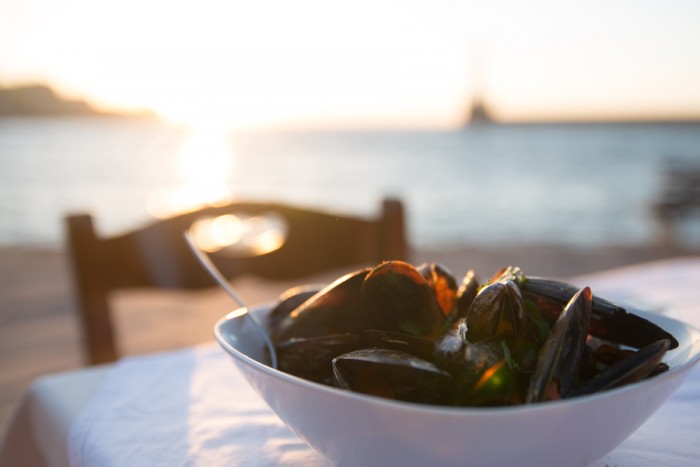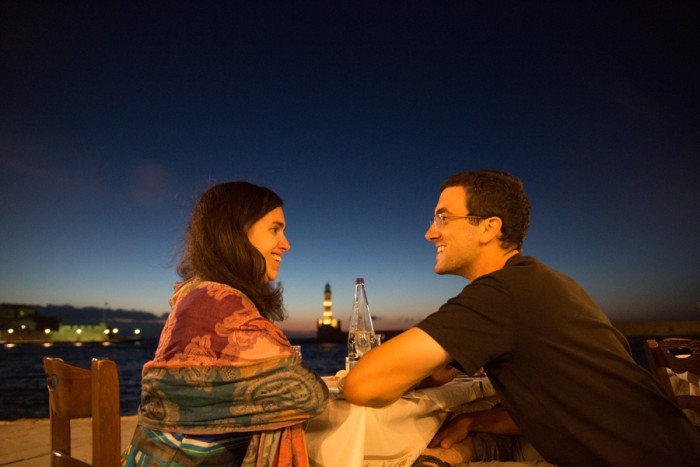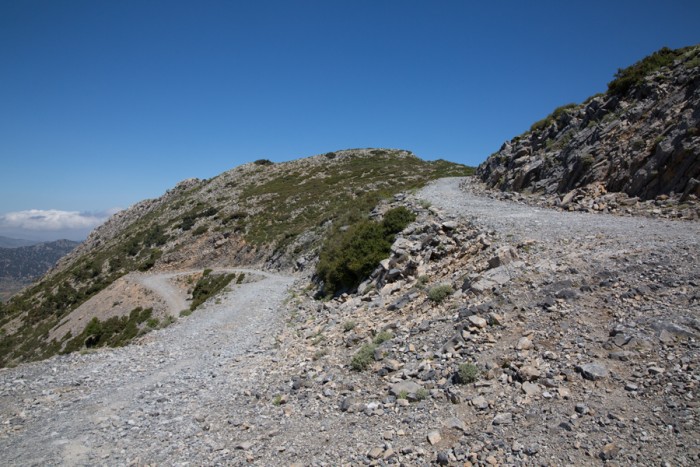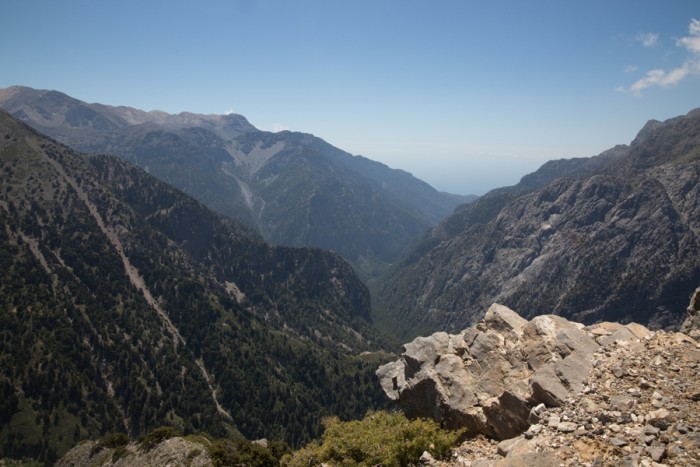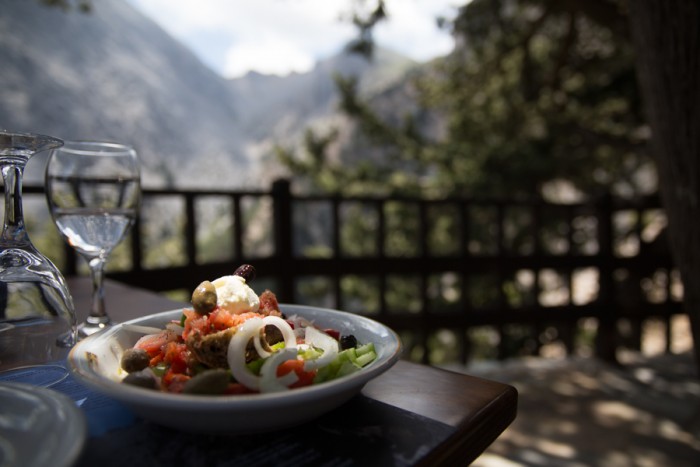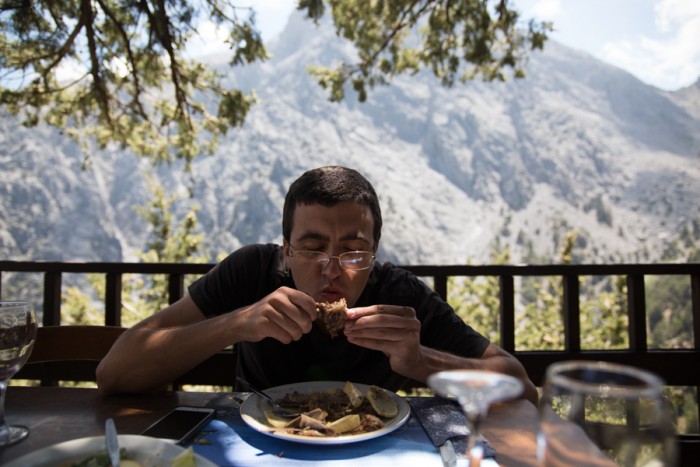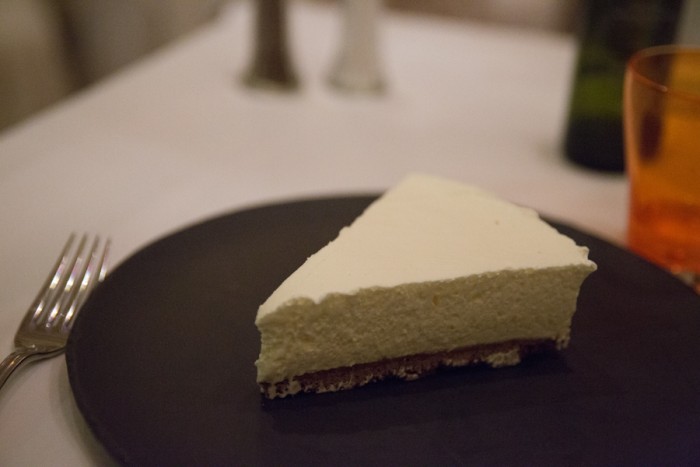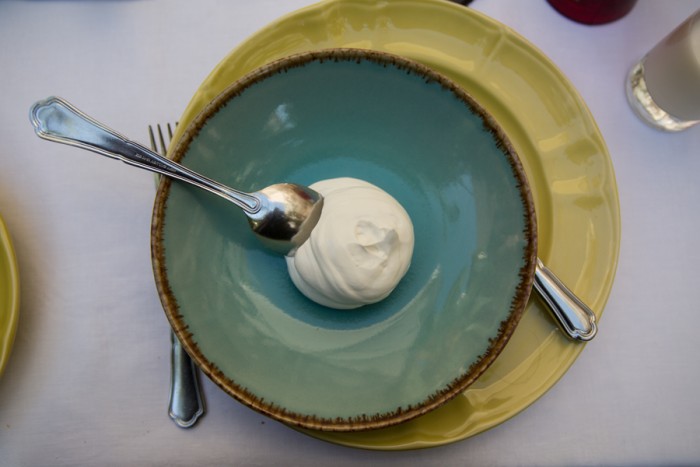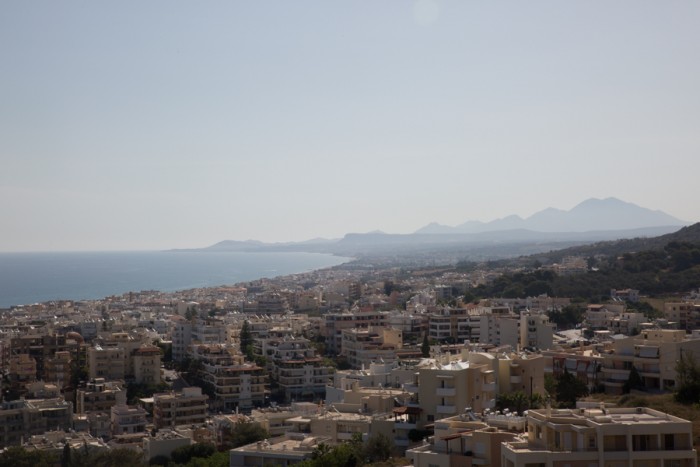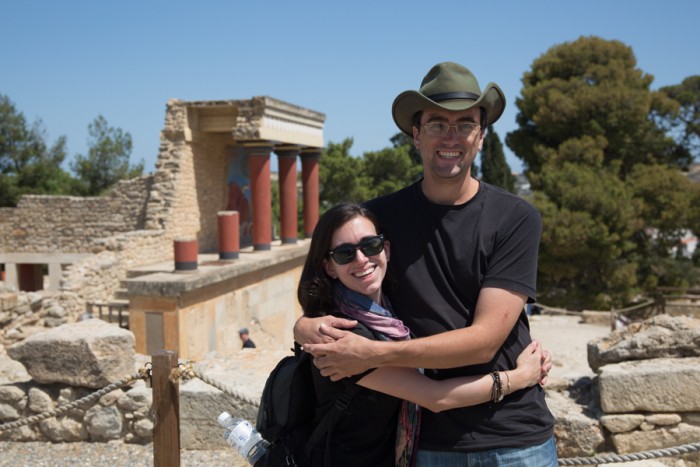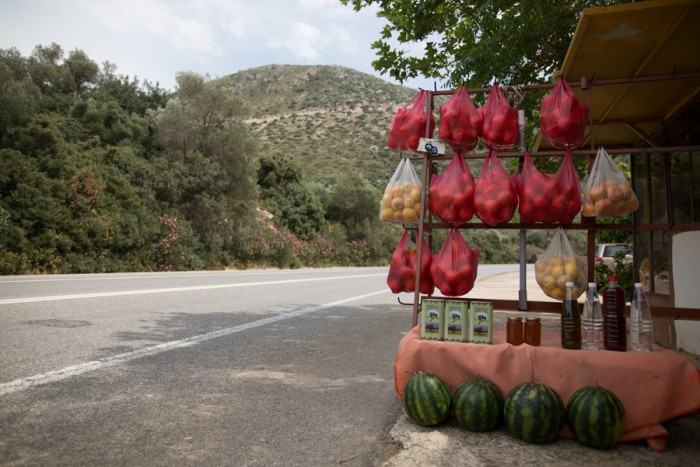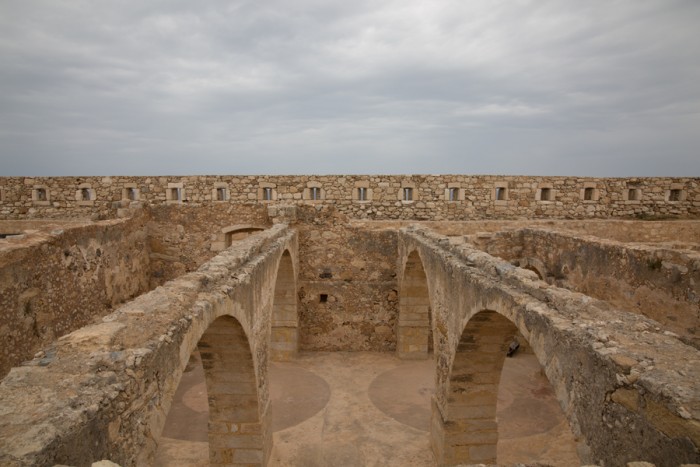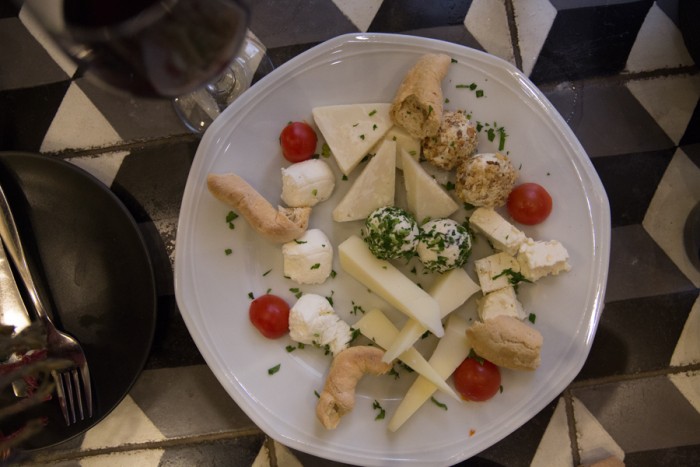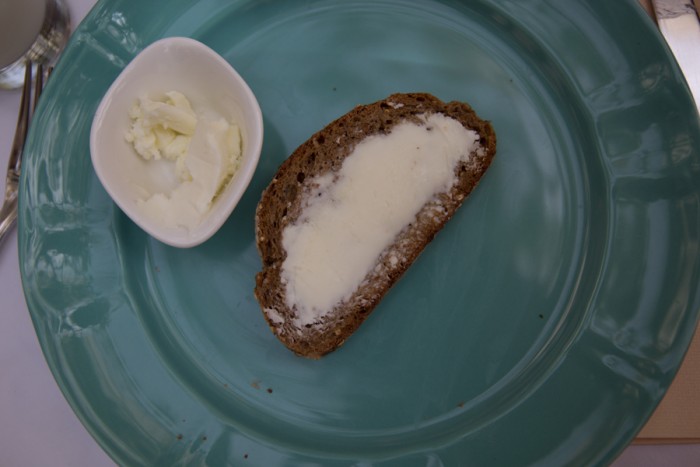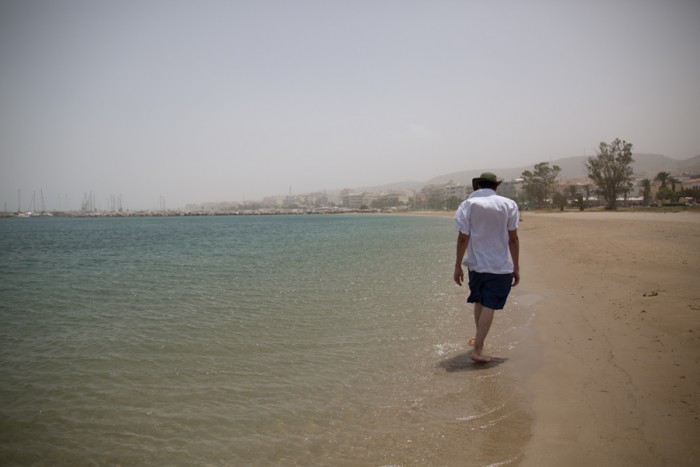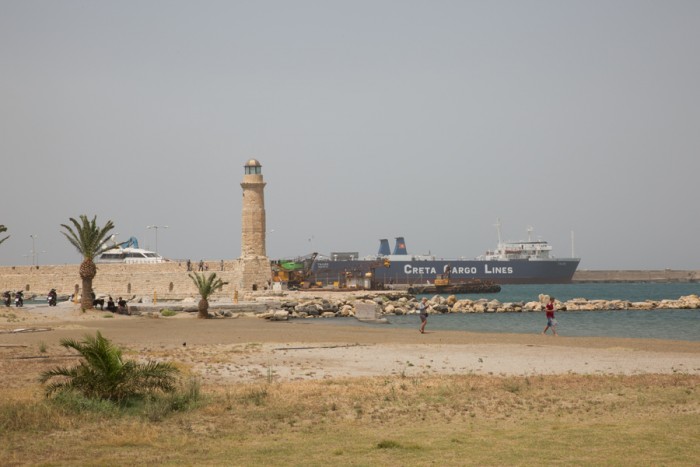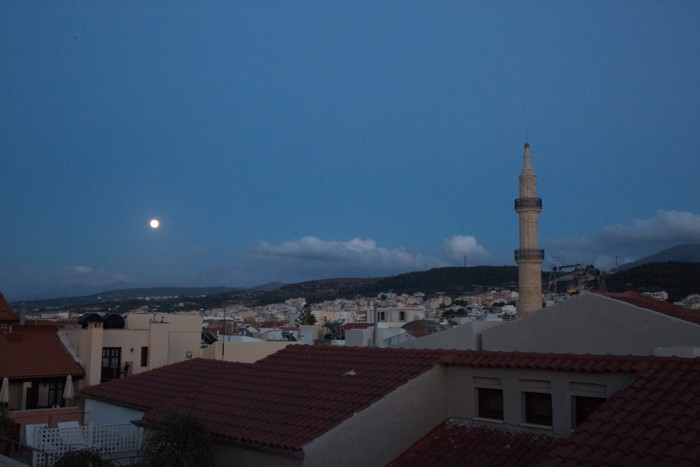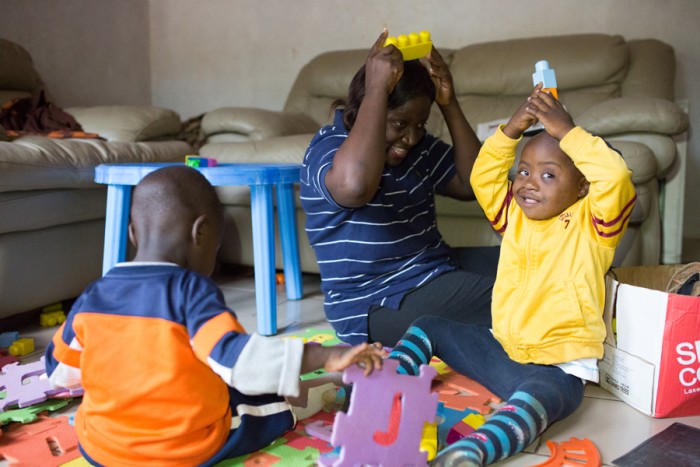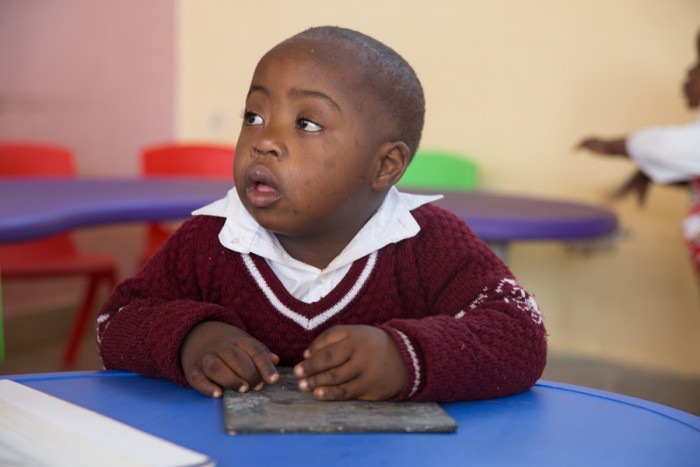June 12th, 2016 by Rachel | Tags: Disability, Peace Corps, Persons with Disabilities of Cameroon, Photography | No Comments »
During the last seven months of my Peace Corps service, I am featuring photographs and stories of several persons with disabilities living in Cameroon. All the photos are part of a series called “Persons with Disabilities of Cameroon.” The goal of presenting photographs and their stories is to create better awareness about the plights that persons with disabilities face in a developing country. When I return to the US, I hope to exhibit this series in a gallery and publish a book to educate others about persons with disabilities living in developing countries as this topic is so rarely discussed in the media.
Feldinad, an elder in his 80’s has been living most of his life with hearing loss. He told me that one morning when he was eight years old, he woke up feeling that his ears were all blocked. He said he also had fever. When he got up, he went to a hospital in town. The doctors used devices to blow into his ears everyday for six months but it provided no results. However, he continued to go to school and completed primary school and then went onto training in construction. He couldn’t go to secondary school because of his struggles to hear. He has been working for private companies and NGOs in construction. He said that they have been offering him jobs because he has been able to demonstrate to them that he does good work although he believe that he still gets less work than people without disabilities. He also has been married and has eight children.
When observing Feldinad, he is still able to communicate through listening and spoken language. However, when he communicates, people have to sit next to him and speak loudly into his ears. When he communicates with people, he places his hands behinds his ears and curves his hands around the outer ear so that he can hear his best.
“I have problems with the ears. When I am talking, I can’t hear well. If I put my hand like that I can hear a bit,” he said.
He does not have hearing aids, but he said that “If I have hearing aids, I could hear people better.”
When I asked him what are his biggest challenges, he said that he wants to work for the government in construction but they will not accept his applications because he cannot hear well. He also said that he would like to be able to buy machines so that he can be self-employed but has no money because he has not been able to work as many hours as persons without disabilities.
Then I asked him if he ever feels lonely because of his difficulties to communicate with others due to hearing loss. He said, “When I am with people and I try to discuss with them, I am not isolated. It is because they help me understand what they are saying.”
June 1st, 2016 by Rachel | Tags: Cooking Class, Food, Greece, Travel | No Comments »
Alex and I, being foodies, signed up for a cooking class at Avli, a restaurant that also has a hotel where we stayed for four nights in Rethymnon, Crete. The cooking class was one of the highlights of our trip to Crete. Katerina, the owner of the hotel, gave us a private cooking lesson. She was so good that I asked her if she has a book, which she unfortunately doesn’t. She taught us about the history of food in Crete, how the culture, geography and economics influenced the cuisine and how to cook 12 different dishes. She has truly not only taught us how to make the dishes she showed us but also she inspired us to explore in creating new dishes with limited ingredients
Katerina first explained to us that in order to eat a well-balanced meal, all we need is bread drizzled with olive oil, tomatoes, olives, and goat and sheep cheese and also a small glass of raki. This simple plate of food will make us feel full. She explained that even a poor person living in Crete can still eat a very healthy meal because of what the geography has to offer in terms of growing crops and maintaining livestock. I shared with her that I read an article online about how even though Greece is facing an economic crises, many people are not facing starvation because they’re still able to grow just enough good food and raise just enough livestock on the farm. She said that is indeed true. We also learned that goat cheese and sheep cheese are common in Crete because there is no space for cows on the island. We also learned that olive oil is a huge staple in Crete not only because olives are so abundant in the country but also because it provides good nutrients for the heart. We learned that there is a belief that olive oil contributes to the longevity of Cretans. Throughout the cooking class, we learned that olive oil is used religiously in Cretan cooking.
Katerina then proceeded to show us how to make two different dishes using the same ingredients which were bread, tomatoes, cheese, and olive oil. First we learned to make a bruschetta which compromised of bread with mashed tomatoes mixed with olive oil on top of bread with cheese and olives. Then we learned to make a tomato salad which compromised of cheese, bread crumbs and olive oil mixed together to look like a salad dressing and then it was mixed with chopped tomatoes and olives. In spite of same ingredients, the taste of each dish was different. That was the intention of learning about making these two dishes. Then we made a caprese salad to learn other ways to create dishes with tomatoes, cheese and olive oil.
We learned to make various other cold dishes such as potato salad with greek yogurt, olive oil and herbs, a salad with potatoes, hard boiled eggs, zucchini, and tomatoes, salad made of mashed fava beans, salad with mixed beans,and tzatziki.
As Alex and I were learning to how to make different simple dishes using same ingredients while also enjoying variety of tastes, we both discussed that we had wished to learn how to make them prior to joining the Peace Corps so that we could teach people in our communities in Cameroon how to make simple well-balanced diet meals with limited number of ingredients. From our personal experience in living in Cameroon and eating with Cameroonians, we often find that many eat almost same dishes everyday. However, they could learn how to make different dishes using the same ingredients. Also, in Cameroon, they do not use vegetables to their fullest potential as carbohydrate is their staple of their diet and therefore, we could have taught them how to make variety of simple appetizing dishes using vegetables with hopes to encourage them to eat more vegetables.
Then we learned to make hot dishes such as stuffed mushrooms, smoked pork mixed with grape syrup, olive oil and mushrooms, goat mixed with onions, olive oil, goat butter, and herbs. Then for desert, we were treated with greek yogurt.
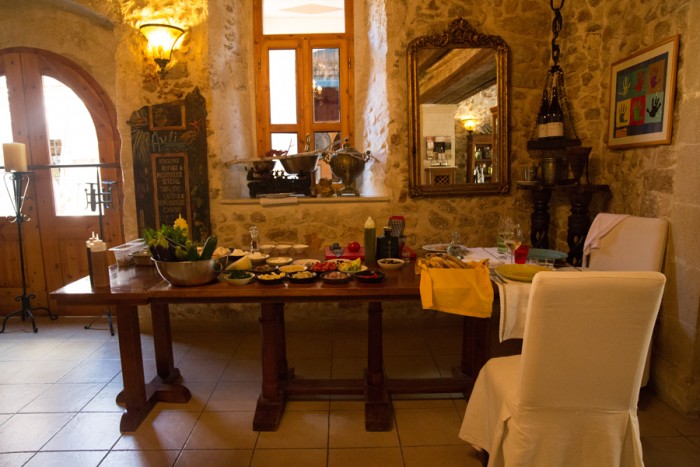
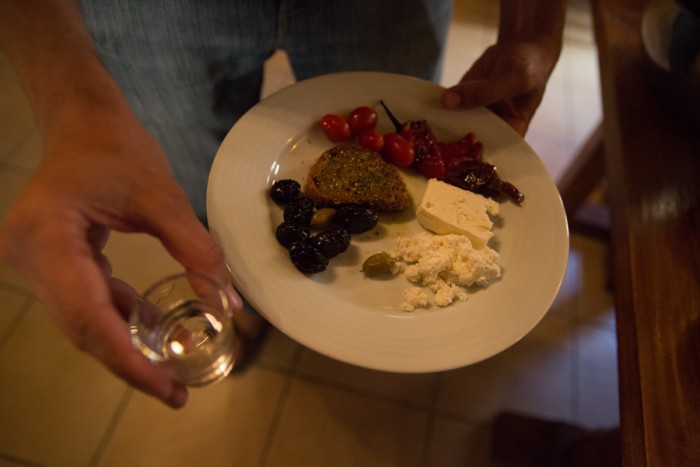
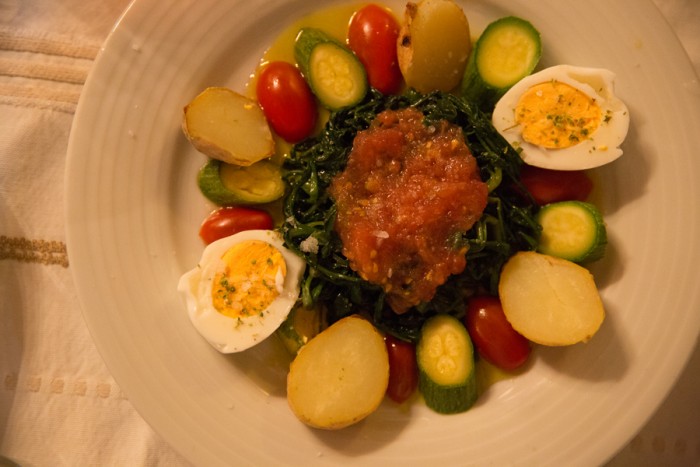
Click here to sign up for the cooking class at Avli.
June 1st, 2016 by Rachel | Tags: Food, Greece, Travel | No Comments »
Alex and I both have been living in Cameroon for one and a half year, and we both very much needed a break from our challenging current lifestyle. We needed to be in a place where we could forget about work and focus on relaxing and also continuing to expand our minds. Greece was the place to be.
Greece is a country where food, history and scenery meets at one place. When standing at the top of Hotel Plaka and looking at the stunning view of Acropolis at sunset, one pauses for a moment and marvels at the stunning construction of the Parthenon. Then when walking through the narrow streets of Plaka neighborhood and seeing people eat feta cheese, sausages, olives and ice cream, one can’t help but want to eat as soon as possible. As soon as we arrived at the hotel after traveling by plane for more than 12 hours, we didn’t wait too long to get a taste of feta cheese and honey. Feta cheese made in Greece tastes like nothing like any other Feta cheese found outside of the country. The honey found in Greece is so sweet. Alex and I not only ordered a fried feta cheese soaked in honey, but we also ordered sausages which was also very appetizing.
Over the course of two days in Athens, Alex and I visited various ancient sites throughout the city and also the Acropolis Museum while also tasting Greek yogurt, baklava ice cream, and olive oil and bread. No one has ever tasted Greek yogurt until they have eaten it in the country of its origin. Greek yogurt purchased in the US is not Greek yogurt. It’s a yogurt that just happened to be called Greek yogurt. Eating Greek yogurt in Greece is like eating a spoonful of whipped cream. It’s light and fluffy and less sugary but oh so good! We also met up with a classmate of mine from grad school who took us to a Greek-Japanese fusion restaurant called Nolan. The chef is half Greek and half Japanese and prepares appetizing food that combines the best of both cuisine. We enjoyed chicken covered in tempura crumbs, smoked fish and boas with pork stuffed inside.
On the second night when I was tired and contemplating whether or not I wanted to walk up a large hill, Alex and I agreed to take a stroll to Philopappos Monument. It was a decision that I was glad not to say “no” because walking up the hill during the sunset turned out to be so relaxing and when standing by the monument, we were gifted with a stunning view of the Parthenon.
Right before Alex and I got the plane to head to Crete, we stopped at Scholarhio, a restaurant nestled in the Acropolis that allows us to taste variety of Greek food. At 30 euros for two people, Alex and I were able to enjoy five different plates which included calamari, fried cheese, meatballs, sausages, and tiropita.
Once Alex and I landed in Chania, the second largest city in Crete, we were given a very warm welcome by the hosts of our apartment which we booked through Airbnb. We were greeted with wine, raki, olive oil and honey which were all homemade from the hosts’ home village, Vouves, and also cheese and bread. We then ventured out in the old town where we witnessed a beautiful sunset over the blue Mediterranean Sea. We had our first taste of Greek lamb and sheep and also loukoumades at Chrisostomos, a place known for its lamb dishes. The following day, we continued to explore the old town, visiting the Maritime Museum, the oldest practicing synagogue in Greece, and lighthouse. Then we spent a romantic evening eating mussels and octopus by the water while the sun was setting.
The following day, we explored the stunning countryside of western Crete with Safari Club. We traversed the White Mountains, both on paved road and road with gravels, viewed the Samaria Gorge from the top, ate lamb in the mountains, and saw the oldest olive tree in the world which is three thousand years old. After spending the day touring the countryside, we visited the Archeology Museum in Chania, which was a small museum exhibiting various old potteries, coins, tools, jewelry and tombs.
Alex and I then spent the last four days in Rethymnon, an old Venetian fortress city, at a lovely hotel made for foodies. Avli was first founded as a restaurant and then it expanded by adding a hotel. We took an incredible private cooking class with the owner and founder of Avli, Katerina, which was a highlight of our trip. I will save all the info about the cooking class for another blog post. I do have to note that when one visits Avli restaurant, their cheesecake is a must to eat. It is the best cheesecake I have tasted in my life. Like Greek yogurt, it’s light and fluffy. I am guessing that it’s made with goat and sheep cheese instead of cow cheese.
On one of the days in Rethymnon, we ventured out to Knossos with a taxi driver who was also a tour guide. Alex was dreaming of seeing the Parthenon and Knossos since he was 11 years old, and so it was a dream come true for him. We also visited the Archeology Museum in Heraklion which was necessary as many of the artifacts found at Knossos is displayed at the museum.
We also spent some time relaxing at the beach and enjoying the beautiful turquoise water. We also toured the fortress and visited the Contemporary Museum of Art. We also enjoyed the nightlife by eating a waffle with chocolate and bananas, a beer and hot chocolate at midnight.
On our very last night in Greece, Alex and I witnessed a stunning full moon while dancing on top of Avli hotel. While Alex and I enjoyed the sceneries, history and food, what we have enjoyed the most is being able to hold hands and kiss in public spaces without being stigmatized by others around us. In Cameroon, because of the cultural norms, showing any signs of affection is forbidden in public places.
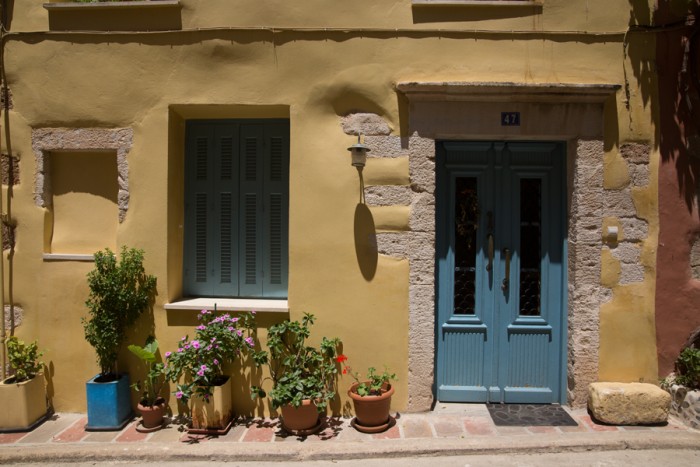
Flower pots are spotted everywhere in Crete
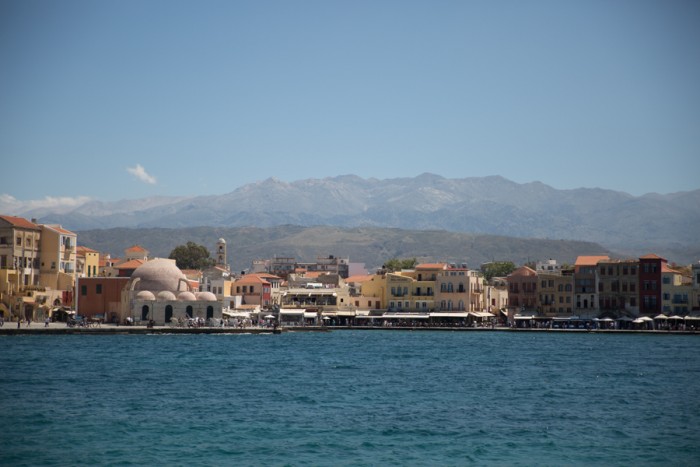
View of Chania from the lighthouse
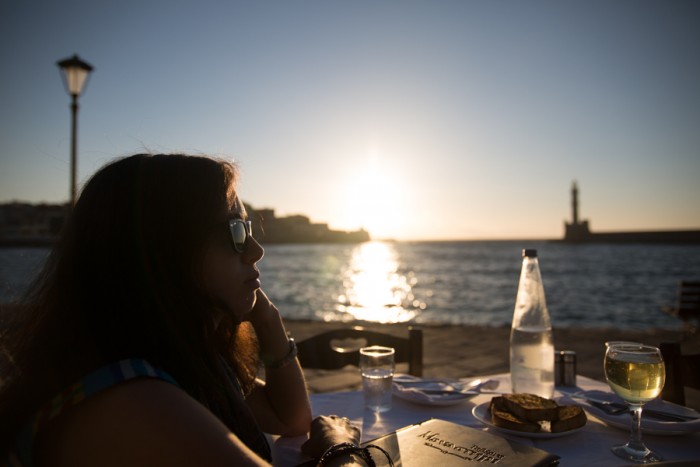
Eating by the Mediterranean Sea at Monastiri
Places to Eat in Athens:
Cookie Land || Delicious Baklava ice cream.
Scholarhio || Two people can eat five different Greek dishes for 30 euros.
Nolan || Japanese-Greek Fusion Cuisine. The chef is half Greek and half Japanese.
Osterman || Delicious chocolate peanut butter souffle.
Twister || Fabulous fried feta cheese with honey and other Greek food.
Ydria || Good general Greek food.
Places to Eat in Chania:
Chrisostomos || Known for their lamb and sheep. They also make delicious loukoumandes.
Tamam || Located inside an old Turkish bathhouse. Delicious goat-sheep cheese and Cretan cheese pie.
Monastiri || Located right on the harbor by the water. Sit outside to see a stunning view of the sun setting behind the lighthouse.
Colombo Kitchen and Bar || Located inside the old town. Delicious smoked pork and Cretan cheese pie.
Agora Market || A public market where one can find cheese, honey, olive oil, and fresh bread.
Places to Eat in Rethymnon:
Avli || Stay at their hotel to enjoy their lovely breakfast which includes Cretan cheese pie, omelette, fried goat cheese and rice pudding. Eat their cheesecake. Take their cooking class.
Prima Plora || Located a mile outside of the old town but it sits by the water offering a stunning view of the old town and offers delicious seafood.
The Italian Job || Variety selection of pasta. Went there to enjoy a good bowl of Carbonara pasta.
Where to Stay:
Hotel Plaka || Athens || Great central location in Plaka neighborhood. Very close to all historical sites. Lovely bar at the top overlooking the Acropolis.
Airbnb || Chania || Thirty second walk from the harbor in old town. Fantastic hosts. Clean apartment and comfortable bed. Provides complimentary olive oil, honey, wine, and raki, all homemade.
Avli || Rethymnon || Great central location in old town. A must-to-stay for foodies. First opened as a restaurant. Offers cooking classes.
May 12th, 2016 by Rachel | Tags: Disability, Peace Corps, Persons with Disabilities of Cameroon, Photography | 4 Comments »
During the last seven months of my Peace Corps service, I am featuring photographs and stories of several persons with disabilities living in Cameroon. All the photos are part of a series called “Persons with Disabilities of Cameroon.” The goal of presenting photographs and their stories is to create better awareness about the plights that persons with disabilities face in a developing country. When I return to the US, I hope to exhibit this series in a gallery and publish a book to educate others about persons with disabilities living in developing countries as this topic is so rarely discussed in the media.
Antonia, a Cameroonian, was living in Tunis, Tunisia, in 2011 working as a personal assistant for a diplomat of African Development Bank. At 10 to 12 weeks pregnancy, she learned through ultrasound that her unborn child had Down Syndrome. If she was in Cameroon, she would never have known that she was pregnant with a child with Down Syndrome. Ultrasounds do not exist except in the two largest cities, Douala and Yaounde, and they are available only to pregnant women who are wealthy and have the financial means to pay for them. Most women in Cameroon never even know the gender of their child until the baby is born.
Abortion was presented to Antonia as an option. She was counseled. She was presented with information about the challenges of raising a child with Down Syndrome. She was encouraged to have an abortion. She said “No” to abortion because she was already aware of Down Syndrome. She first met a 14 year old girl in Cameroon with Down Syndrome who was raped repeatedly by a neighbor who then died from being raped in the late 1990’s in Bamenda. She saw a 3 year old girl with Down Syndrome, who was abandoned in a stream and died in the early 1990’s in Mamfe, a village near Bamenda where she grew up. She said that this is a village tradition that has been practiced in many parts of Cameroon. They believe that children with Down Syndrome are snakes.
Two years before she was pregnant, she met a girl with Down Syndrome in a church in Tunisia who was from the U.S. She was attending the church with a friend from the US who was a medical student there . When she saw the girl with Down Syndrome, she said to her friend, “She looks like one of those funny children in Cameroon.” The medical student said “No, it’s Down Syndrome.”
“After church, she taught me about Down Syndrome. She educated me on the chromosome 21 replication. So, I now knew what Down Syndrome was and two years later I was pregnant with my first son and with diagnosis of chromosome 21 in testing. ”
When I asked her if she immediately knew that she wanted to keep the baby when she found out that he has Down Syndrome, she said, “At first I cried. I had so many questions. Why me? I went back to the children in Cameroon. Then the success stories coming from the U.S. It was then I decided to keep my boy.”
When she found out about her son, Aidriking, she called her friend who was a medical student from the U.S. and told her the news. “She encouraged me to be strong and everything will be fine,” said Antonia. She gave her information about Buddy Works, an association for people with Down Syndrome. She called the organization and they promised to send her a support kit, but she never received it. She looked up more information about Down Syndrome on the internet all while she was pregnant.
When Aidriking was born, in December 2011 in Tunis, he had a heart defect. He had laser heart surgery at 2 months which was not effective, and so he had to have open heart surgery. The cost of open heart surgery in Tunisia was more than she could afford, and so she had to return with him to Cameroon for that surgery, which he had at age 11 months.
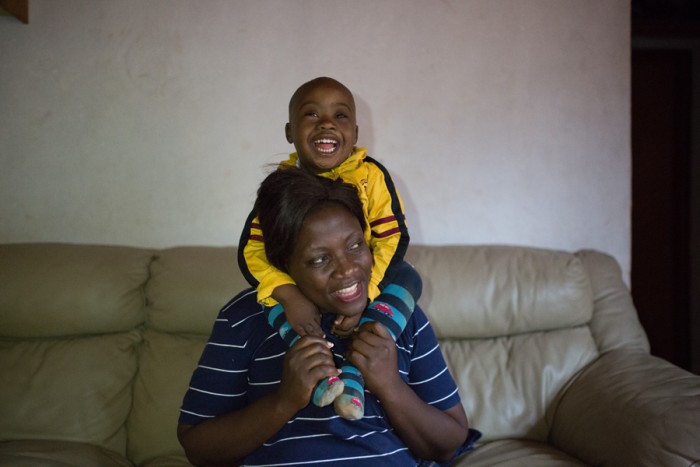
Antonia shares her strong love for her son, Aidriking.
“From there, I decided to start advocating for other children with Down Syndrome because there were a lot of ignorance and a lot of cultural malpractices of these children. So, I decided to tell my story and use my son as an example to show love and care for these children. I think it’s not easy advocating and changing the perception that the society already has about children living with Down Syndrome. So my wish is to open an educational center to train and a home to accommodate because most children with Down Syndrome live on the streets. I’d like for the center to be a school to bring children with Down Syndrome and children without disabilities together. The goal is to provide a mainstream school for children with Down Syndrome,” said Antonia.
She would like to train children with Down Syndrome on life skills. As children with Down Syndrome get older, those who can’t continue in mainstream schools will to move vocational training. Those who can continue their education will stay mainstreamed with children without disabilities.
Aidriking was enrolled in the best private preschool in the city of Bamenda in September 2015. He was sent out of the school on the 10th of February, 2016. She received a letter saying that her son could no longer attend the school because other parents were not comfortable with their children being in the same classroom as her son.
Starting a school has always been an idea but since when Aidriking was sent out, Anotnia has been more motivated to start the center.
When she was pregnant with Aidriking, Antonia also started thinking about creating a foundation for children with Down Syndrome in Cameroon. She had the option to stay in Tunisia but decided to move back to Cameroon. The foundation, Aidriking’s Foundation, became a reality in 2014. “I went on national television for the first time in Cameroon. It was the first time information about Down Syndrome was on television in Cameroon, ” said Antonia.
After her appearance on television, Antonia received over 200 phone calls and text messages from parents of children with Down Syndrome. They were very happy to have more information. Children with Down Syndrome and their families then visited her home to learn more.
In December 2015, Anotnia held the first fundraiser for the foundation. On March 21st, the foundation celebrated World Down Syndrome Day for the first time.
She is now forming a support group for families with children with Down syndrome. She found another school that agreed to take Adriking and he started there in mid-April 2016.
Antonia still faces stigma in the community where some residents are still of the mindset that witchcraft is behind children with Down Syndrome. They tell her that there is a curse in the family, and there is something wrong with the family. They tell her that “He is not a normal child and he’s a snake.” She responds by saying, “I still love my son like any other child like he is the best. Like he’s a king.”
Other parents of children with Down Syndrome have copied her example, and they all fight together now to change the misguided perception of members of their community.
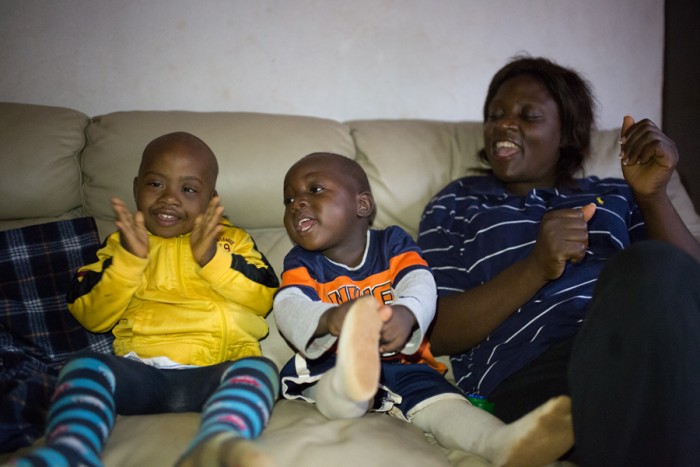
Antonia sings a song with her sons.
May 7th, 2016 by Rachel | Tags: Disability, Peace Corps, Persons with Disabilities of Cameroon, Photography | No Comments »
During the last seven months of my Peace Corps service, I am featuring photographs and stories of several persons with disabilities living in Cameroon. All the photos are part of a series called “Persons with Disabilities of Cameroon.” The goal of presenting photographs and their stories is to create better awareness about the plights that persons with disabilities face in a developing country. When I return to the US, I hope to exhibit this series in a gallery and publish a book to educate others about persons with disabilities living in developing countries as this topic is so rarely discussed in the media.
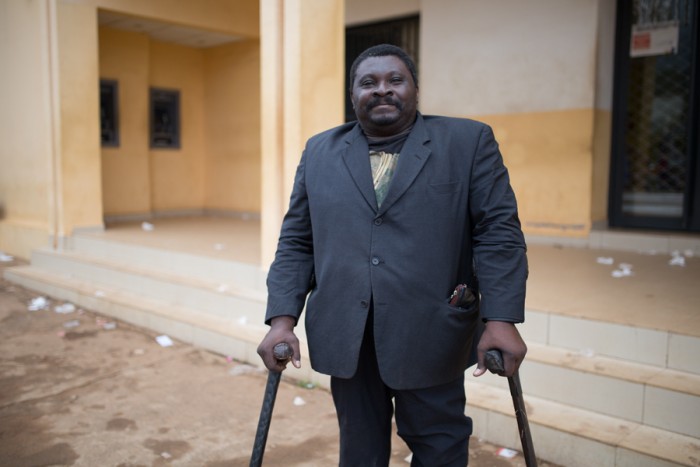
Dr. Alfred Ndi is one of the very few persons with disabilities who is financially successful. It was his parents’ dedication to ensuring that he received the best quality of education growing and his determination that allowed him to succeed in receiving a PhD and becoming a professor at University of Bamenda. In spite of being a successful person, like all other persons with disabilities in Cameroon, he still faces barriers.
He had polio when he was two and a half years old. He was walking and playing with ease before having polio. When he was diagnosed with polio, he had fever and was taken to the hospital by his parents. The doctor applied quinnimax injection. His legs then became weak. “Back in the early 1960’s in Cameroon, people did not understand quinnimax and its effects,” said Dr. Ndi.
Shortly after his diagnosis of polio, Dr. Ndi said that neighbors said that witchcraft caused paralysis. “My parents refused to hear those words,” he said.
“They tried all kinds of remedies such as traditional medicines. Hospital medicines. [Then] somebody advised my parents not to waste time on treatments and send me to school,” he said. His parents were taking him to place to place for traditional treatments for several years. He did not finally start going to a primary school, Presbyterian Boys School, until the age of nine years old in 1970 in Limbe where he was born and raised.
“I was very intelligent. I was promoted twice. The teachers in class one felt like they were wasting me time and so they sent me to class two. Then in class two in the same year, I passed the exams to class three. Then in class three, the teachers saw that they were wasting me time and so they promoted me to class four. I wrote the exam for class four and passed and went to class five. Class six and seven , I passed the first school living certificate in 1975, and I graduated from primary school.”
Dr. Ndi experienced some bullying due to his disability and inability to play sports while attending primary school. “I remember in primary school the children made fun of me because I was the only disabled person in the school and so, they liked to play with me but I did not like to play and so they did not understand why I did not like to play. For instance, they would force me to play football with them. I would fall down when playing football especially when I would try to kick the ball and miss it. And so I lost my balance. So, I did not like to play football but the children enjoyed seeing me fall down. So I refused to play football, they will bully me and try to beat me if I did not go play football with them. I used my sticks to kick the ball and I missed the ball. But I was a good goal keeper and I never missed to stop the ball from entering the goal post.”
Dr. Ndi grew up in a home with very loving but strict parents. “My parents especially my mother was disciplinary. My mother would discipline me very much. She would not let me go out and visit and play with friends even to the Botanical Gardens. So she was very strict with me,” he said. “I sneaked when I went to school especially during the break time because the school was next to the gardens. My parents would control me a lot,” said Dr. Ndi.
When I asked him if they were strict to him because of his disability, he said, ” I think it was partly because of my disability but also because they loved me very much. They were afraid that if they allowed me to move around, I may get into problems of any kind. So it was a way of them to protect me because I am the only son. I was an inquisitive child because I liked to go out and see things and experiment things but that was not to the liking of my parents. They wanted me to stay by their side. They were afraid that I may go out and have an accident and they would lose me.”
Then he went to secondary school called Government Secondary School in Limbe and graduated from there in 1980. Then from 1980 to 1982, he went to high school at CCAST Bambili, a village near Bamenda. Then in 1985, he finished first degree in bilingual studies. From 1984 to 1985, while he was studying for his first degree, he studied in France at Université Jean Moulin III in Lyon. After completing his first degree, he went to the UK to participate in a program on knowledge management. Then he returned to Cameroon where he completed a masters degree in applied linguistics in 1987 and a post-masters called M.Phil in cultural studies 1991. Then he finally began pursuing his PhD in 1991 in knowledge management and critical studies and completed it in 2006.
While pursuing his masters degree and PhD, he taught at University of Yaounde I from 1986 to 1991. Then he relocated to Bamenda and began teaching at University of Bamenda in 1992. Today, he is still teaching at University of Bamenda.
“As a professor, do you face any kind of discrimination because of your disability?” I asked Dr. Ndi.
“No. Not any kind of discrimination. On contrary, the school administrators and my colleagues, they respect me a lot,” he said.
“What kind of challenges do you face as an adult with disability?” I asked.
“Accessibility. Like getting to a building. No ramps. No lifts,” he said.
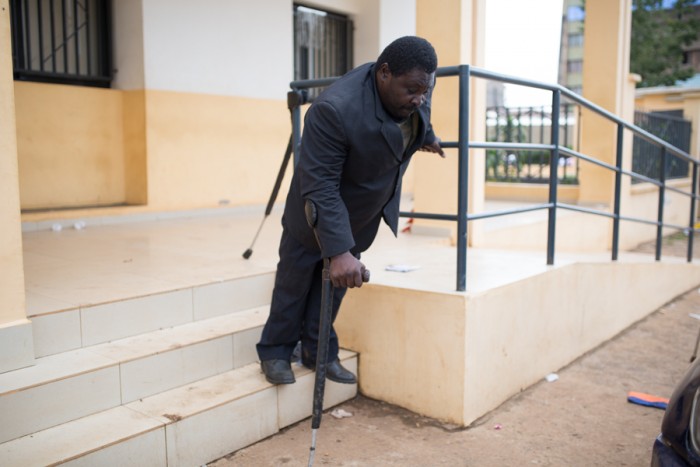
Dr. Ndi demonstrates his struggles to use the stairs.
Dr. Ndi took me to a bank one day that had a ramp. When he showed me the ramp at the bank, he shared with me that he advocated to get the bank build the ramp. “I talked with the bank director and because I have a bank account with them, I told him that if they don’t build a ramp, I will bring all disabled persons here and have them block the bank until the ramp is built. It took six months of constant reminders for them to finally decide to build this ramp and the decision to build a ramp was taken and it took them just one month to build it. And after they built it, many other banks followed the suit and built their own ramps. So, on Commercial Avenue, you’ll see ramps built in front of banks. And I also persuaded University of Bamenda to build ramps into all facilities and schools of the university and they complied. Churches are also building ramps thanks to this example.”
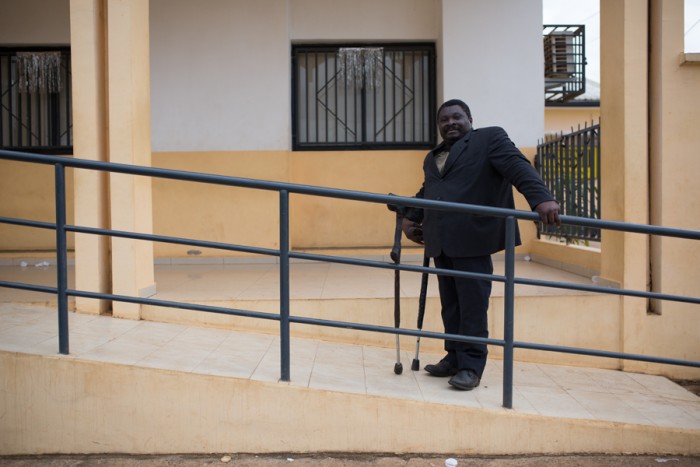
Dr. Ndi shows the ramp that he was able to persuade the bank to build.
“I don’t look at challenge as a problem. But as an opportunity to help others because I understand very well the difficulties that other disabled person go through when it comes to accessibility issues. So, it’s really not a problem to me because whenever I want to work, I go to a place that has a level ground. I do work in there. I don’t move around in quarters where accessibility is a challenge. One of the major concerns which I have beyond my disability has to do with the system of higher education in Cameroon. I think that the system is underperforming because it is not managed well and so, it is not competitive enough,” said Dr. Ndi.
